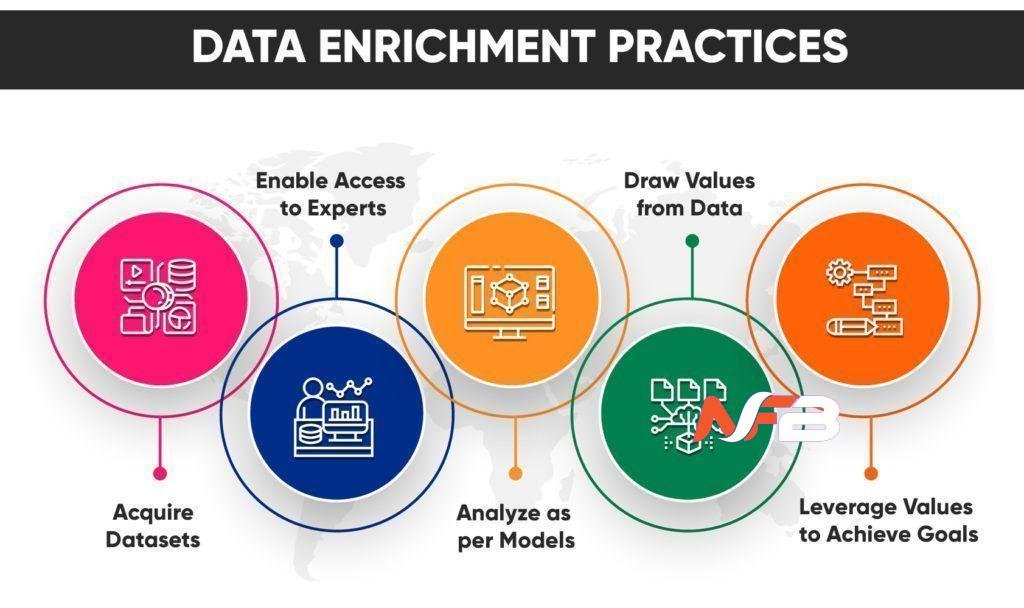In today’s fast-paced business world, customer relationship management (CRM) systems have become indispensable. They serve as a central hub for managing interactions with clients, improving sales pipelines, and driving customer retention strategies. However, the value of your CRM system is only as good as the quality of the data within it. Enter data enrichment solutions, specifically leveraging a data enrichment agent, which can transform incomplete, outdated, or inaccurate CRM data into a robust source of actionable insights.
Here’s a closer look at how data enrichment solutions can elevate your CRM performance, improve customer experiences, and boost your bottom line.
What Is Data Enrichment
Data enrichment refers to the process of enhancing existing data by adding additional, contextually relevant information to it. For CRMs, this involves augmenting raw customer records with insights like demographic data, behavioural patterns, and firmographic details (for B2B businesses).
For instance, if your CRM only has a client’s email address, a data enrichment agent can integrate data points such as job title, company size, industry, or even social media profiles. This turns a basic contact into a comprehensive customer profile, empowering your sales and marketing teams to engage more effectively.
Common CRM Challenges Resolved By Data Enrichment
- Incomplete Customer Profiles
Without enriched data, CRM systems may hold fragmented customer records, making it difficult to deliver personalized outreach or understand customer needs. Data enrichment agents add the missing pieces, creating a 360-degree view of every customer. - Outdated Information
Customer data becomes obsolete quickly as individuals change jobs, update contact details, or shift purchasing behaviour. A data enrichment agent can continuously refresh records to ensure your CRM remains relevant. - Lack of Segmentation
Effective marketing campaigns rely on precise audience segmentation. Data enrichment solutions can provide key attributes that allow you to target the right customers with the right message. - Inefficiencies in Sales Outreach
Sales teams often waste time researching prospects to fill in gaps in CRM data. Automating this process with enrichment tools streamlines workflows, enabling reps to focus on selling.
Benefits Of Using Data Enrichment Solutions For CRM
Enhanced Personalization
Enriched data gives you the ability to tailor communications to individual customers or client segments. For instance, knowing a prospect’s industry and pain points enables you to craft emails, pitches, or offers that resonate with their specific needs.
Improved Lead Scoring And Prioritization
A data enrichment agent can provide actionable insights into lead quality by evaluating attributes such as company size, revenue, and purchasing patterns. This ensures your sales team focuses on the most promising opportunities.
Seamless Cross-Channel Campaigns
With enriched CRM data, your marketing team can align efforts across email, social media, and paid advertising campaigns, delivering consistent messaging that enhances customer engagement.
Better Customer Retention
Understanding customer behaviour and preferences helps you proactively address potential churn. Enriched data allows you to spot trends and engage customers with timely offers or support.
Reduced Operational Costs
By automating data enrichment tasks, businesses can reduce manual data entry and research efforts, leading to significant time and cost savings.
The Role Of A Data Enrichment Agent In CRM Improvement
A data enrichment agent is a tool or platform designed to integrate external datasets into your CRM in real-time. These agents typically pull from vast databases, public records, social media, and other sources to update and complete customer records.
Key Features Of Data Enrichment Agents:
- Real-Time Enrichment: Automatically update CRM records with fresh data as it becomes available.
- APIs for Integration: Seamlessly connect the enrichment agent to your CRM system.
- Customizable Rules: Tailor enrichment processes to prioritize specific data points relevant to your business.
- Data Validation: Ensure that incoming data is accurate and reliable, reducing errors.
By acting as the bridge between raw data and actionable insights, data enrichment agents play a pivotal role in improving CRM functionality.
Steps To Improve Your CRM With Data Enrichment
- Audit Your Existing CRM Data
Start by identifying gaps, inaccuracies, or redundancies in your current database. Highlight the specific types of information you need, such as phone numbers, social media profiles, or firmographics. - Choose the Right Data Enrichment Agent
Look for a tool that aligns with your business needs. Key factors to consider include compatibility with your CRM, the breadth of available datasets, and compliance with data privacy regulations. - Integrate and Automate
Use APIs or native integrations to connect the data enrichment agent to your CRM. Automate the enrichment process to maintain data quality without requiring manual intervention. - Focus on Data Hygiene
Regularly cleanse your CRM by removing duplicates, resolving inconsistencies, and archiving inactive records. Combining data hygiene with enrichment ensures your CRM remains both accurate and actionable. - Leverage Enriched Data for Insights
Use the enriched data to create detailed customer segments, predictive models, and dynamic reports. These insights can inform strategic decisions across marketing, sales, and customer support. - Train Your Team
Ensure your teams understand the capabilities of your enriched CRM system. Provide training on how to leverage enriched data for personalized outreach, efficient lead management, and impactful campaigns.
Real-World Applications Of CRM Data Enrichment
B2B Sales Optimization
A technology company enriched its CRM data with insights like prospect company size, industry, and recent funding rounds. This enabled their sales team to prioritize high-value leads, resulting in a 35% increase in conversion rates.
E-Commerce Personalization
An online retailer used data enrichment agents to track customer preferences and purchase history. This allowed them to deliver tailored product recommendations, boosting repeat purchases by 20%.
Improved Customer Support
By integrating data enrichment with a CRM, a telecom provider equipped its support agents with a complete customer history, improving first-call resolution rates by 15%.
Challenges And Considerations
While data enrichment offers numerous benefits, it’s important to approach it thoughtfully. Here are some common challenges to watch out for:
- Data Privacy Compliance: Ensure that the data enrichment agent adheres to GDPR, CCPA, and other relevant regulations.
- Overloading CRM: Adding excessive data points can overwhelm users. Focus on quality over quantity when selecting enrichment fields.
- Integration Complexity: Choose a solution with straightforward integration capabilities to avoid technical issues.
Improving your CRM with data enrichment solutions is not just about adding more data—it’s about adding the right data. A data enrichment agent empowers businesses to transform incomplete and outdated records into a rich resource of insights that fuel customer-centric strategies. By leveraging enriched CRM data, you can enhance personalization, drive more meaningful engagements, and make informed decisions that directly impact your bottom line. The result? Stronger customer relationships and a competitive edge in your market.
As the saying goes, “Knowledge is power.” With data enrichment solutions, you’re equipping your CRM—and your business—with the knowledge needed to succeed.











Leave a Reply